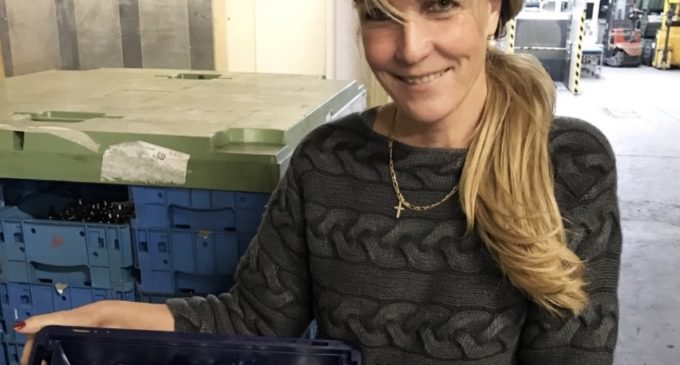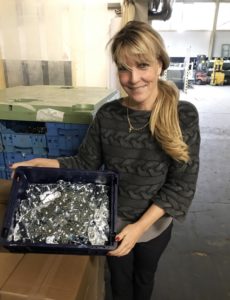NPR: Why Germany Still Succeeds in Manufacturing

MEDIA SPOTLIGHT – Why has Germany maintained its manufacturing base?
Weld nut manufacturer Schmittenberg Metal Works was featured in an National Public Radio report on Germany’s strength in manufacturing.

Yvonne Schmittenberg
NPR’s John Ydstie points out that manufacturing accounts for almost a quarter of Germany’s economy. That is twice the rates for the U.S. and Canada.
South Korea leads the world with manufacturing value added accounting for 29% of the gross domestic product. China is second at 27% and Germany third with 23%.
The U.S. is 10th at 12% and Canada 11th at 11%. Mexico is 6th with 19%.
Founded in 1932, Schmittenberg Metal Works supplied weld nuts for the first Volkswagen Beetle. After World War II, the manufacturer began supplying parts for Germany’s recovering automotive industry. Today the Wuppertal, Germany-based manufacturer stamps out parts by the millions for the world’s automotive industry.
Ydstie described weld nuts for the NPR audience as “small but critically important parts. Most are about the size of a silver dollar with a small-threaded tube sticking up. They are welded to a car’s body and used to bolt on things like seats and seat belts, so they must be able to hold up against the violent forces unleashed when cars collide or smash into something.”
Weld nuts look “like something that these days would be manufactured in a low-wage country,” Ydstie reported.
He quoted Schmittenberg’s sales manager Christian Rieder that their weld nuts “are highly engineered parts” and “incredibly strong.”
Rieder cited a threaded plate welded to a steel girder as capable of hanging “four Mercedes-Benz S-Classes on” and the threads would not strip, even holding the eight tons.
Ydstie cites “that attention to engineering and quality is a hallmark of German manufacturing companies.”
CEO Yvonne Schmittenberg told Ydstie that quality is what makes German companies competitive.
“Obviously we are under pressure and we have to fight for market share every day, but still quality is our main issue, and we would never shift to anywhere when quality is in slightest question,” NPR quotes her.
This is one of the strengths of the Germany’s traditional “Mittelstand” – small to medium size companies that are the “foundation of the country’s manufacturing success.”
“They’re often family-owned and focus on long-term success, not on maximizing short-term profits,” Ydstie explained. “They pay attention to quality.”
Yvonne Schmittenberg advised the industry to “pay attention to your workforce. Don’t presume every kid should go to college. Get them interested in making things. I think this so important to keep the youngsters interested in manufacturing. And this starts at the schools … to have the kids running around with open eyes being interested in technical issues, see how things get done and really get them motivated on how to do that.”
Can the U.S. increase domestic manufacturing by embracing the German quality?
Brookings Institution economist Martin Baily told NPR he thinks it would be a good thing if the U.S. had more manufacturing to provide jobs for people who aren’t highly educated, but that “would be very difficult to achieve.”
“I would not advise U.S. companies or U.S. policymakers to try to replicate what’s happened in Germany,” Baily told NPR. “In fact, I would look at Germany and say you’re going to have a tough time going forward, in fact you’re already having a tough time as some production shifts to eastern Europe.”
Baily pointed to advancing technology that will displace even highly-skilled manufacturing workers.
Jeromin Zettelmeyer of the Peterson Institute for International Economics and former German government economist told NPR that Germany may soon find that it is too reliant on manufacturing.
“There is a very serious worry that we might lose our manufacturing edge over the next 10-20 years and be in the same situation the U.S. is now — except, without having grown a new growth engine like the IT sector in the meantime,” NPR quoted Zettelmeyer.
As Germany and the U.S. face the future, they are caught in a “grass is always greener” moment, where each sees in the other the thing it does not have, Ydstie summarized. Even if Germany is really good at manufacturing, maybe it needs to try to emulate the U.S. and start looking beyond manufacturing to find post-industrial jobs to drive its economy.
Editor’s Note: Articles in MEDIA SPOTLIGHT are excerpts from publications or broadcasts, which show the industry what the public is reading about fasteners and fastener companies.


There are no comments at the moment, do you want to add one?
Write a comment